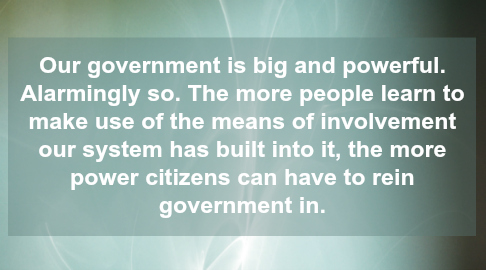Last week, the Wall Street Journal reported that “After years on the back burner of the nation’s educational agenda, civics is making a comeback, with a number of states mandating new classes or assessments and a burgeoning national push for high-school seniors to pass the exam required of new citizens.”
Websters Dictionary defines civics as “the study of the rights and duties of citizens and of how government works.” The Wall Street Journal points out that civics lessons cover “the role of citizens in public issues” and “such topics as how to dissect current events and apply the Constitution to modern issues.”
Amazingly, civics classes have not been part of school curricula since the sixties. Despite that deficiency, people still get active in politics. But they have to get their civics education somewhere else. I got mine from working on political campaigns with my parents and with friends, from my involvement in a group called Concerned Women for America, and from a local Republican Women’s Club.
A non-profit called the Campaign for the Civic Mission of Schools told the Journal that, until the 1960’s, the typical American high school offered three classes in civics and government. Today, high schools do require students take classes in American government, but normally the course “focuses on the structure of democracy more than the practical realities of making it work.”
That’s changing.
The Journal quotes Paul Baumann, Director of the National Center for Learning and Civic Engagement who says, “We’re seeing more rumblings of states and local districts recognizing the need for civic engagement, especially for youth.”
Alas, among students who took the National Assessment of Educational Progress in 2006 and 2010, two thirds tested “below proficient” on the civics portion.
Why have we ignored civics in recent decades?
The Journal suggests one reason: Federal education programs like No Child Left Behind and Race to the Top link money flowing to states to math and reading testing. Consequently schools have cut time devoted to other subjects.
I think the emphasis our educational system places on preparing students for careers over and above preparing them to be good citizens has squeezed subjects like civics out. Now officials concerned about low turnout by minority voters are attempting to bring it back.
Conservatives and Christians ought to capitalize on this trend. Teachers should be taught ways to lead discussions on controversial issues so that pro-family and economically conservative views get a fair hearing. There’s always the risk that teachers will introduce their biases into the classroom. But the greater risk is that students would not know about the political tools they can employ to make a difference on issues that are important to them.
Let’s face it, our government is big and powerful. Alarmingly so. The more people learn to make use of the means of involvement our system has built into it, the more power citizens can have to rein government in.
 Listen Online
Listen Online Watch Online
Watch Online Find a Station in Your Area
Find a Station in Your Area











 Listen Now
Listen Now Watch Online
Watch Online
